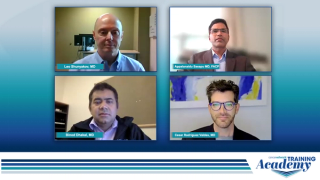
Multiple Myeloma
Latest News
Latest Videos

CME Content
More News

The panel concludes the discussion by offering future perspectives on the evolving treatment landscape in multiple myeloma, highlighting exciting developments and ongoing research.

Experts on multiple myeloma provide clinical insights on how they triage and prioritize patients to best utilize available resources.

Myeloma specialists discuss their approaches to determining the optimal timing for leukapheresis for patients awaiting CAR T-cell therapy.

Donna Catamero, ANP-BC, OCN, CCRC, presents the case of a 77-year-old patient who experienced ICANS following CAR T-cell therapy and describes the role of the ICE score.

Experts on multiple myeloma provide clinical insights on strategies to manage or mitigate CRS, highlighting premedications, the role of bridging therapy, and potential treatment strategies.

The June Hot Topics focuses on the challenges venetoclax regimens have faced in multiple myeloma trials.

Continuing discussion centered on a patient case, the panel discusses bispecific antibody combinations and the role of BCMA-targeting CAR T-cell therapies in relapsed/refractory multiple myeloma.

Adriana Rossi, MD, presents the case of a 60-year-old patient with stage III kappa light chain multiple myeloma, and members of the panel provide their initial impressions.

The panel discusses the mechanisms believed to cause cytokine release syndrome associated with CAR T-cell therapy and the signs and symptoms.

Focusing on the transition of patients from community practices to academic centers, the panel discusses the initial evaluation and treatment processes, focusing on bridging therapy for patients awaiting CAR T.

A panel of experts on multiple myeloma introduce themselves and discuss the initial process of identifying patients who are potential candidates for CAR T-cell therapy.

Beth Faiman, CNP, PhD, presents the case of a 76-year-old woman with multiple myeloma who experienced cytokine release syndrome (CRS) following CAR T-cell therapy.

The panel discusses the utilization of CAR T-cell therapy for patients with multiple myeloma, highlighting treatment selection, sequencing, and insurance considerations.

The panel concludes its discussion with key takeaways on the evolving role of CAR T-cell therapy in the treatment of patients with relapsed/refractory multiple myeloma.

Binod Dhakal, MD, presents the case of a 66-year-old patient with IgG kappa multiple myeloma, and the panel discusses treatment considerations and decisions.

Data support prophylactic treatment with tocilizumab as an option to mitigate the risk of CRS for outpatient dosing of teclistamab.

Experts on multiple myeloma discuss how they educate and prepare patients who are going to receive CAR T-cell therapy and provide clinical insights on transitioning patients to community practices following treatment.

A panel of experts on multiple myeloma give an overview of unique challenges in managing adverse effects associated with CAR T-cell therapy as compared with other cancer therapies.

Data from the PERSEUS trial also show that responses deepened over time in both arms among patients with transplant-eligible multiple myeloma.

Whether CAR T-cell therapy or T-cell engagers should dominate the multiple myeloma landscape may be hard to determine, says David S. Siegel, MD.

Most infection events among those with newly diagnosed multiple myeloma in the MajesTEC-7 trial appeared to occur early during study treatment.

Isatuximab, bortezomib, lenalidomide, and dexamethasone prolonged PFS vs bortezomib, lenalidomide, and dexamethasone, in a subsect of patients with multiple myeloma.

Next steps for research in the multiple myeloma space may include the development of novel CAR T-cell strategies and bispecific antibodies.

Similar outcomes were noted when linvoseltamab and teclistamab were analyzed as treatments for patients with relapsed/refractory multiple myeloma.

Data suggest that those with relapsed/refractory multiple myeloma and poor functional status may benefit from talquetamab without increased toxicity.





































